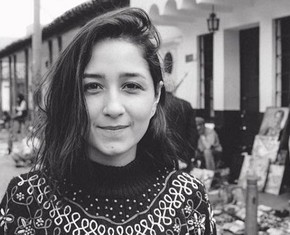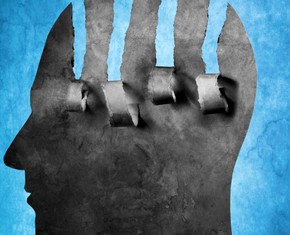The views expressed in our content reflect individual perspectives and do not represent the authoritative views of the Baha'i Faith.
When my cosmopolitan family arrived in Melbourne, Australia, I felt tremendous kindness at my new school. Since I felt no kindness from my own family, it surprised me.
My gratitude for the kindness I felt overflowed into a design of pressed flowers which I made depicting the school badge.
Our teacher read us the Bible story of Doubting Thomas, which ends with Jesus saying, “Blessed are they that have not seen and yet have believed.” She added: “He meant us, you know,” and my new friends looked pleased.
But later that night I wrote at home: We only believe what our parents and teachers have taught us all our lives. We haven’t been through any great test of our faith. Just supposing Christ had come into our classroom then? Would we have believed in him?
I worried over this, but despaired of Christ ever turning up in my lifetime, or of having the chance to be tested this way.
At home, my parents treated me so cruelly that my grandmother, who lived in Switzerland but came to stay fairly often, would say during each visit, “You’ll go insane in this house. As soon as you’ve had enough education, you must come and look after me.” I felt so grateful to her for loving me that I wanted to fulfill her request.
But during my third year at Melbourne University, I fell in love with a young man who loved me. I explained to him that if he and I were finally to be together, it was only right that I give my grandmother a year of my life, to make up for my not fulfilling her dream of having me look after her forever.
It looked like that year of separation would be one of his and my many tests. My parents, who felt superior to everyone, despised Jews most of all, and the Australian Jewish community was strongly against anyone marrying out. My beloved was a Jew.
On October 20, 1962, near the end of my yearlong stay with my grandmother, I looked in her diary, as was my duty every morning, to see what she planned for the day. I saw that “The Bab (who came to prepare the world for Baha’u’llah, whose message would be greater than his own) was born on October 20, 1819.”
“What is this?” I asked.
“I know what you are looking for,” she said. “I am taking you tonight to meet people who are working toward unity.”
My grandmother took me to a Baha’i meeting. Half of the people present were American, one man was Dutch, and some others came from Iran. There was delicious food, and a warm atmosphere. I could feel a powerful spiritual presence. Everyone mixed together, and the air was thick with their real love for each other. I sensed a sincere desire from the higher social echelons to serve the lower, which seemed to make everyone happy. This was startling in a country like Switzerland, since, coming from Australia, I had been terribly distressed at how the porters at the train stations grovelled in front of my grandmother and me.
From my little corner of Switzerland, the class structure looked rigid. My aristocratic Russian relations and royalty, like the Queen of Spain who’d been exiled to Switzerland and who played bridge with my relatives, seemed to be on top, and then the Swiss took up the middle, and they imported labor from Italy to fill the bottom. But in this room full of Baha’is, laborers from the “bottom” rung of society spoke out with confidence and wisdom, sure of everyone’s love enfolding them. I knew that something gigantic must be behind this, and that my duty before anything else was to find out what on Earth could overturn the European class structure so thoroughly—and produce that much kindness and love.
As I came to know the Baha’is that month, I wrote in my journal: “This is not a sect but a complete religion, its members whole and healthy in their minds, without the poisons of bickering and backbiting. They are the sanest people I’ve ever met.”
On that first evening, the Baha’is had given me books, and the first one I opened was by a newspaperman who had been discussing, with a whole lot of other newspapermen, what would be the most startling headline they could write. They came up with “Christ Returns!”
I thought “That is it! Nothing less could have changed the people at that Baha’i gathering so profoundly.”
This was no time for fence sitting, I thought. If the Spirit animating Christ had truly manifested again on Earth through the founder of the Baha’i Faith, I would be turning away from Christ if I rejected him.
If the fruit is good the tree is good and the prophet is true. Christ himself promised that.
I read actual Baha’i writings that said:
In the divine Holy Books there are unmistakable prophecies giving the glad tidings of a certain Day in which the Promised One of all the Books would appear, a radiant dispensation be established, the banner of the Most Great Peace and conciliation be hoisted and the oneness of the world of humanity proclaimed. Among the various nations and peoples of the world no enmity or hatred should remain. All hearts were to be connected one with another.
These things are recorded in the Torah, or Old Testament, in the Gospel, the Qu’ran, the Zend-Avesta, the books of Buddha and the book of Confucius. In brief, all the Holy Books contain these glad tidings. They announce that, after the world is surrounded by darkness, radiance shall appear. For just as the night, when it becomes excessively dark, precedes the dawn of a new day, so likewise when the darkness of religious apathy and heedlessness overtakes the world, when human souls become negligent of God, when materialistic ideas overshadow spirituality, when nations become submerged in the world of matter and forget God—at such a time as this shall the divine Sun shine forth and the radiant morn appear. – Abdu’l-Baha, The Promulgation of Universal Peace, pp. 220-221.
In all the holy books—for example, those of Zoroaster, Buddha, Krishna, Moses, Christ and Muhammad—you can find the promise God made to Abraham, that He would never leave His people without a teacher. Each of these teachers, when the Spirit of God spoke through them, talked about coming back “at the time of the End,” the end of the era of prophecy and the beginning of the era of fulfillment, when God’s Will would be done on Earth. They all referred to the same person: Baha’u’llah, the Glory of God, the Messiah to the Jews, the promised Shah Bahram to the Zoroastrians, the Fifth Buddha to the Buddhists, the return of Lord Krishna to the Hindus, the Twelfth Imam to the Shia Muslims and the return of the Spirit of Christ to Christians and to the Sunnis!
Christ himself said “Blessed is he who hath not denied my new name.” I knew it in my heart: the heavenly Day which for centuries we had implored God to hasten had begun!
All Baha’i principles, teachings and laws are geared toward creating unity. The one law the Baha’is made sure I knew immediately is that a person needs the consent of all four living parents to marry. I thought, “After all we have been through, there goes my beloved’s and my chance of ever marrying!” But much more important to me than the self-indulgence of being with him was that, like a moth, or like St. Peter who dropped his nets instantly when Christ called “Follow me,” I was pure-hearted enough to recognize Baha’u’llah, the Glory of God, and immolate my more selfish desires on this flame.
I wrote to the local Baha’i Spiritual Assembly, saying: I know almost nothing about the Baha’i Faith except that it is the truth. God has opened my heart now, and if you don’t accept me now, I believe He will close it again and even if I am surrounded by Baha’is all my life I will not join. I know that Baha’u’llah is the manifestation of God for this age and I will help the community. My biggest fear is not to be a Baha’i.
They accepted me and I have become a Baha’i a little bit more every day. When our parents eventually gave their consent, the man I loved became, and still is, my husband.
















Comments
Sign in or create an account
Continue with Googleor